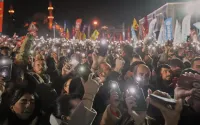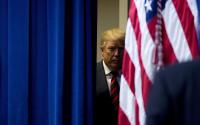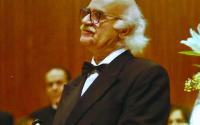One can imagine the agents queuing up this morning to offer their clients as the required coaches and mentors of the would-be contestants. How about a dream line-up of Alastair Campbell and Ann Widdecombe taking on the role played by judge Simon Cowell in Pop Idol. Both have a fine line in nasty put-downs that would have the audience gripped. We'd need Mo Mowlam for a combination of straight talking and encouragement. For tips from those who have learned the hard way, William Hague and Iain Duncan Smith, and add advertising guru Maurice Saatchi and the pollster Phillip Gould - how could they refuse such a showcase for their talents?
Of course, there will be concerns among broadcasting bosses that this dangerously weakens the boundary between the media reporting news and the media making news, the media observing politics and the media becoming a participant. But there was yet another breach in this increasingly porous boundary when Radio Four's Today programme announced its "listeners' law". The result of "tens of thousands of votes", it turned out to be a draconian proposal - which the MP Stephen Pound, to his great embarrassment, had already agreed to sponsor in parliament - for the use of all means necessary to defend one's property. In the quest for audience participation, we have broadcasters initiating legislation, and now proposing to set up an alternative form of electing our representatives altogether.
Come, come, don't take it so seriously, I hear you say. Of course, contestants will use the programme to launch their political careers, just as those in Pop Idol, such as Michelle McManus, are doing to launch their singing careers - what's the harm in that? Already the arguments in favour of this daft and dangerous idea - could it be called Power Mad? - are being marshalled to get it through the commissioning editor's in-tray. Peter Bazalgette, chairman of the company that made Big Brother, comments persuasively: "This may be the key to younger voters watching political programmes." It's a killer punch, given the desperation in the political establishment at the abysmal levels of voting among 18- to 24-year-olds.
So it will be billed as a great wheeze to re-engage the public with politics, and the critics will be accused of being elitist and anti-democratic. There will be a deal on ruling out racism, repatriation of immigrants and maybe even capital punishment to prevent re-runs of the Today programme's embarrassment. But even after putting these rules in place, this "direct democracy", as it is now grandly called, reinforces the very problems it claims to rectify. Given the plummeting levels of trust and respect in government, it isn't an issue on which we can afford to be so cavalier.
For a start, it would encourage the personalisation of politics. The whole point of all these shows, from Big Brother to Pop Idol, is a form of emotional gladiatorial combat in which we identify with a particular contestant's script. Did they make it against all the odds? Did they hold up in the face of criticism with the right combination of vulnerability and bravery? This, rather than debating policies on NHS reform, is what will attract an audience.
Secondly, it reinforces the illusion that democracy is simple - just a matter of pressing a few buttons on the mobile. Instant, immediate and with evident effect. A few minutes after our vote, the result pops up on the screen. Anything that makes the process more complicated or involves more intermediaries is perceived as less democratic; the polls show that measures of trust in institutions and organisations are collapsing most catastrophically, rather than particular politicians.
But the idea that democracy is that simple is a dangerous delusion. The complexity and the institutions it requires are necessary to build in some degree of impartiality, proper debate, scrutiny and accountability. However imperfect the current system, it is a lot more democratic than unelected, unaccountable television producers deciding (on what criteria?) how the vote is conducted, which contestants to put on the programme, what they have to do - and what they are allowed to say. We are in danger of forgetting that democracy is a slow, laborious, messy matter. Anything else, and it's being rigged for us.
The third, closely related, issue is legitimacy. In an interview a couple of years ago, a top brand consultant argued that brands were more democratic than politicians. My jaw hit the floor, but she crisply continued that millions of consumers choose a particular brand - Heinz or Boots - every day, but that as voters we get to choose only once every five years. There was even a survey in which voters had been asked to choose a brand to run a government department (Boots got the Department of Health). In this cockeyed world, only the market is truly democratic, a view as crazy as it is increasingly influential.
If millions vote for a contestant on this TV show, but only a few thousand bother to turn out in a byelection, who claims the greater legitimacy? Imagine it is the election of 2005: turnout has dropped well below 50% in many constituencies, and the third series of Power Mad, with record viewing figures, has easily overtaken David Dimbleby's election-night special. How do you convince your electorate/audience that one is a form of entertainment and the other will determine the future of the country? Right now the electorate would recognise the difference, but what about in a decade?
What's most worrying is not a Schwarzenegger-style electoral triumph (though that's one of the most likely results), but the implosion of legitimacy and trust in democratic institutions which polls since the mid-90s show is no longer even as gradual as we'd like to think. Recent Mori figures show that only a quarter of people believe the government acts in the national interest, half believe government distorts facts in its favour, and only one-tenth believe government will come clean on a particular issue.
Voting for politicians on the basis of a television programme is a politics of boredom and self-indulgence. Our faith in the capacity of government to do anything is at a historically low ebb; it is the politicians themselves who tell us that they can't intervene in the economy, while the electorate's faith in the politicians to deliver improvements in public services has slumped to just 30%. The danger is that if there isn't much we, or they, believe they can do, true democracy could disintegrate out of sheer indifference, superseded by ersatz successors.






